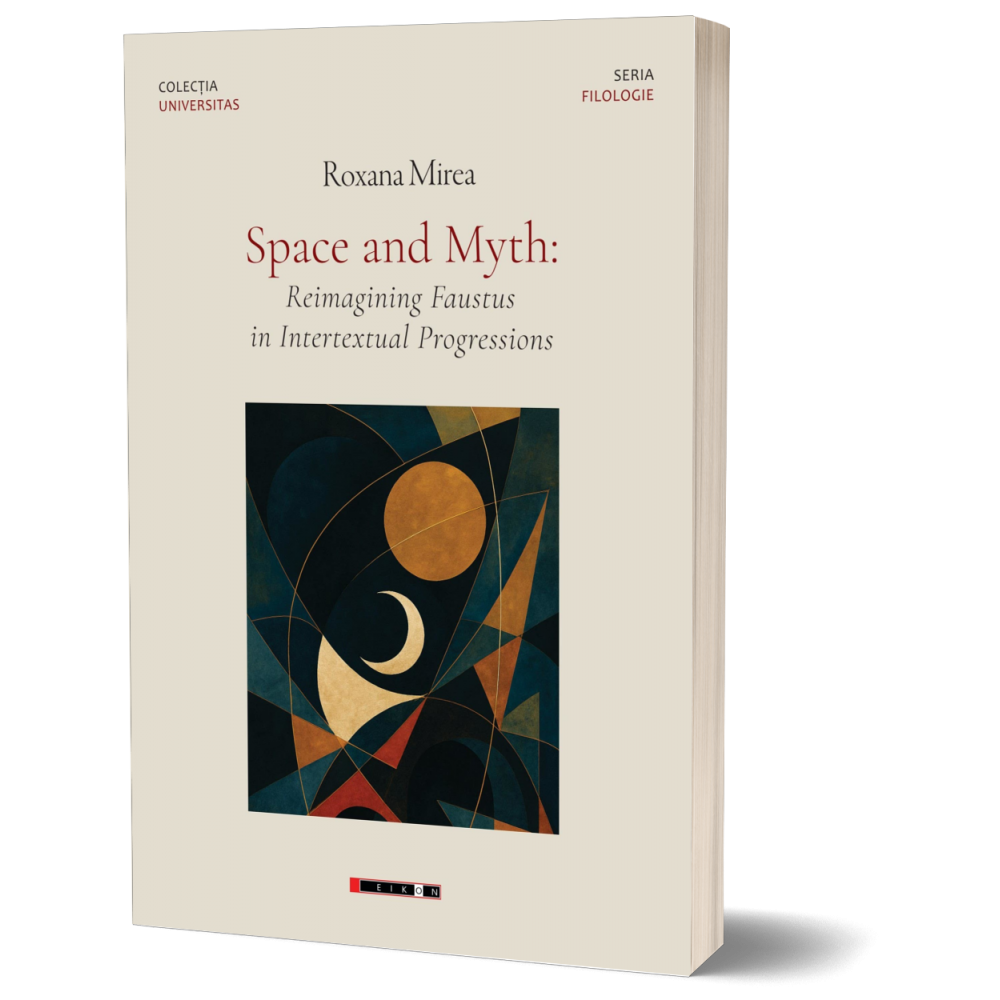
STRATEGII EMBLEMATICE...
AUTOR: Lehel Szakács
ANUL APARIȚIEI: 2025
ISBN: 978-606-49-1531-3
NR. PAGINI: 308
FORMAT: 13x20






(55,00 lei buc.)
AUTOR: Roxana Mirea
ANUL APARIȚIEI: 2025
ISBN: 978-606-49-1434-7
NR. PAGINI: 324
FORMAT: 14.5x20.5
This book explores the evolution of the Faustus myth in English and American drama and fiction, examining how the archetypal figure of Faustus has been reimagined across different historical, cultural, and political contexts. Drawing on a wide range of texts, including Christopher Marlowe’s The Tragical History of Doctor Faustus (1592), Dorothy L. Sayers’ The Devil to Pay (1939), and David Mamet’s Faustus (2004), among others, the book traces how various authors have adapted the Faustian bargain to reflect contemporary concerns.
Through the lens of geocriticism and spatial literary studies, this analysis focuses on the symbolic and metaphoric spaces where the myth unfolds, showing how Faustus’ quest for knowledge is often portrayed as an intellectual or existential journey rather than a simple moral fall. While Marlowe’s Faustus is a tragic figure driven by ego, modern and postmodern adaptations emphasize themes of absurdity, blind arrogance, and dehumanization, reflecting the anxieties of their times.
The study highlights how these adaptations satirize the individualism, materialism, and technicism of modern society, offering a critical look at the ethical implications of human self-aggrandizement. The book uncovers a consistent narrative structure in these rewritings—the Faustian bargain, the misuse of knowledge, and the eventual fall into a symbolic “Hell”—and explores how this framework resonates across various interpretations, whether in drama or novelistic form.
By analyzing the intertextual links between these works, the book provides a comprehensive portrait of the Faustus myth’s transformation, showing its adaptability and relevance in questioning the values of Western modernity and postmodernity. Through these complex narratives, the Faustus myth emerges as a powerful metaphor for the dark side of intellectual ambition and the limits of human potential in the face of societal decay.
AUTOR: Lehel Szakács
ANUL APARIȚIEI: 2025
ISBN: 978-606-49-1531-3
NR. PAGINI: 308
FORMAT: 13x20
AUTOR: Paul Cernat
ANUL APARIȚIEI: 2022
ISBN: 978-606-49-0775-2
NR. PAGINI: 446
FORMAT: 14.5x20.5
AUTOR: I. Negoițescu
ISBN: 978-606-49-0045-6
ANUL APARIŢIEI: 2021
NR. PAGINI: 270
FORMAT: 13x20
Ediție îngrijită de Dan Damaschin și Ioan Milea
AUTOR: Ana-Maria Ionesi
ANUL APARIȚIEI: 2025
ISBN: 978-606-49-1468-2
NR. PAGINI: 300
FORMAT: 14.5x20.5
|
AUTOR: Tomasz Klimkowski |
|
ANUL APARIŢIEI: 2018 |
|
ISBN: 978-606-49-0047-0 |
|
NR. PAGINI: 288 |
|
FORMAT: 17x24 |
| AUTOR: Federico Donatiello |
| ANUL APARIŢIEI: 2020 |
| ISBN: 978-606-49-0271-9 |
| NR. PAGINI: 294 |
| FORMAT: 14,5x20,5 |
| AUTOR: Ana-Maria Ticu |
| ANUL APARIŢIEI: 2020 |
| ISBN: 978-606-49-0339-6 |
| NR. PAGINI: 284 |
| FORMAT: 14,5x20,5 |
AUTOR: Mircea Bârsilă
ISBN: 978-606-49-0411-9
ANUL APARIŢIEI: 2021
NR. PAGINI: 774
FORMAT: 17,5X24
AUTOR: Emilia Ivancu
ANUL APARIȚIEI: 2019
ISBN: 978-606-49-0173-6
NR. PAGINI: 312
FORMAT: 14,5x20,5
AUTOR: Eduard Ciortea
ANUL APARIȚIEI: 2025
ISBN: 978-606-49-1530-6
NR. PAGINI: 348
FORMAT: 13x20
S-ar putea să-ți placă și